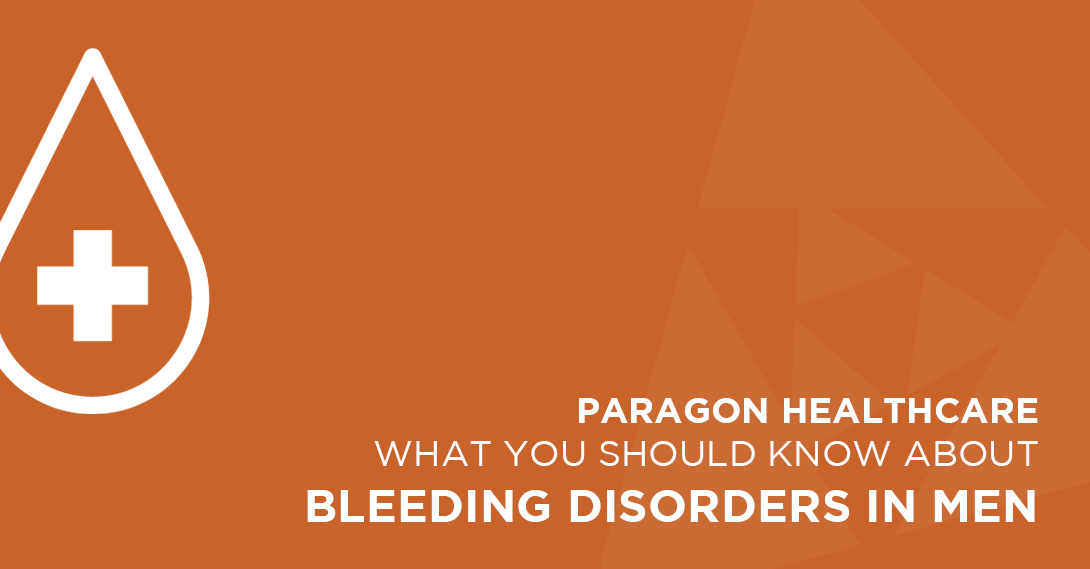June is Men’s Health Month, a national observance used to raise awareness about health care for men and focus on encouraging boys, men, and their families to practice and implement healthy living decisions, such as exercising and eating healthy. At Paragon, we specialize in treating patients with Hemophilia Type A (deficiency in factor VIII, Classic Hemophilia), Hemophilia Type B (deficiency in factor IX, Christmas Disease), and Hemophilia Type C (deficiency in factor XI), which can be diagnosed in both men and women, but is traditionally recognized and requires additional treatment to replace the missing blood clotting factors in males.
What are the symptoms of Hemophilia?
When a person’s blood is lacking or deficient in a particular blood-clotting protein, depending on the severity, they may experience bleeding into the joints, bruising, bleeding of the mouth and gums, frequent and hard-to-stop nosebleeds, difficultly healing or prolonged recovery after surgery, and more. A bleeding episode could potentially lead to chronic joint disease and pain if it is not quickly and carefully treated.
How is Hemophilia diagnosed?
Diagnosis of a bleeding disorder includes screening tests and clotting factor tests. Screening tests are blood tests that show if the blood is clotting properly.
- Activated Partial Thromboplastin Time (APTT) Test. This test measures how long it takes for blood to clot. It measures the clotting ability of factors VIII (8), IX (9), XI (11), and XII (12). If any of these clotting factors are too low, it will take longer than usual for the blood to clot.
- Prothrombin Time (PT) Test. This is a secondary test that also measures the time it takes for blood to clot.
- Clotting Factor Test. Clotting factor tests, also called factor assays, are required to diagnose a bleeding disorder. This blood test shows the type of hemophilia and severity. It is essential to know the type and severity to create the best treatment plan for the patient.
How is Hemophilia treated?
Many bleeding disorder patients receive their factor replacement therapy at a Hemophilia Treatment Center, or in the home setting if using a specialty pharmacy like Paragon Healthcare. If a person with Hemophilia B is deficient in factor IX (9), they would inject that clotting factor into their vein.
What treatments are available for Hemophilia?
The two main types of clotting factor concentrate available are:
- Plasma-derived Factor Concentrates. Plasma is the liquid part of blood. It is pale yellow or straw-colored and contains proteins such as antibodies, albumin, and clotting factors. Several factor concentrate treatment products are available that are made from human plasma proteins. All blood and parts of blood, such as plasma, are routinely tested for safety. The plasma is collected from many people, and then it goes through several processes to separate it into components, such as clotting factors. The clotting proteins are then made into a freeze-dried product, which is tested and treated to kill any potential viruses before it is packaged for use.
- Recombinant Factor Concentrates. Until 1992, all factor replacement products were made from human plasma. In 1992, the U.S. Food and Drug Administration (FDA) approved recombinant factor VIII (8) concentrate, which does not come from human plasma. This concentrate is genetically engineered using DNA technology. Commercially prepared factor concentrates are treated to remove or inactivate blood-borne viruses.
What are inhibitors?
Although it sounds simple, Hemophilia is an incredibly complex disorder. Approximately 15 to 20 percent of people with this bleeding disorder develop what’s known as an “inhibitor.” This is an antibody that the person’s immune system develops that interferes with the body’s ability to accept the factor treatment. It literally “inhibits” the therapy from working because it labels the injected substance as foreign. Patients who develop inhibitors often have difficulty managing and treating a bleeding episode, which results in a higher likelihood of joint disease and other complications.
What types of challenges do men with bleeding disorders face?
There is a lot of stigma surrounding men and the expectation that they must always "be strong." With hemophilia, physical symptoms and challenges can present at any time, which can be difficult for men to openly admit. These suppressed feelings can evolve into psychological and emotional challenges, as well as more severe physical complications when they are experiencing a bleeding episode. If you or a loved one are living with a bleeding disorder, it's important to be honest about what you are going through, especially your health care team. Being open about what you're experiencing, rather than bottling everything up, can help you, your friends and family, caregivers, and health care team make informed decisions related to your condition. Making small positive changes along the way can help improve your overall quality of life, but it requires admitting when aspects of your treatment aren't working and being willing to vocalize when you're struggling or in pain.
What types of services does Paragon Hemophilia provide?
Patients with Hemophilia of any severity level are encouraged to be proactive in the treatment and management of their condition. Our team at Paragon is here to help empower patients to take charge of their health. We partner with each patient’s hematologist and care provider to develop a regimen that is customized to their needs and lifestyle. As a specialty pharmacy, we provide the patients with the prescribed medication and supplies, but we also offer our patients access to clinical resources, educational materials, community support groups, and more. Visit our website to connect with us directly: https://paragonhealthcare.com/hemo/.
To learn more about bleeding disorders in women, read our Women and Hemophilia blog article.






